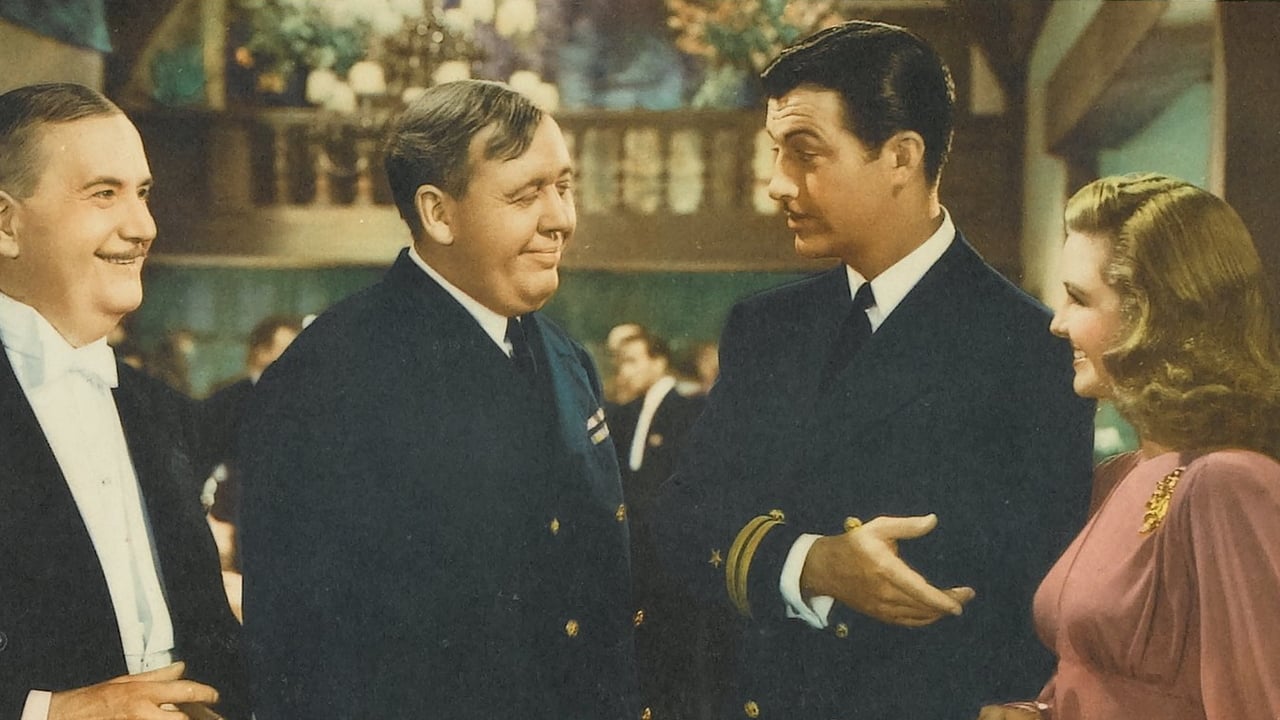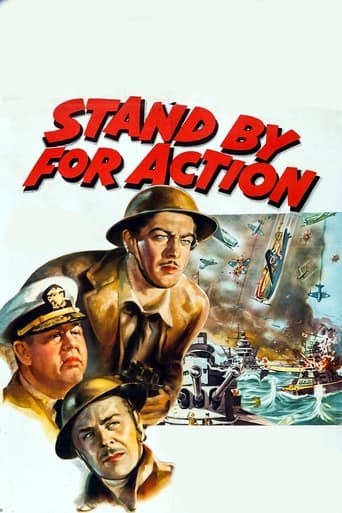

An absolute waste of money
... View MoreIt is interesting even when nothing much happens, which is for most of its 3-hour running time. Read full review
... View MoreThis movie tries so hard to be funny, yet it falls flat every time. Just another example of recycled ideas repackaged with women in an attempt to appeal to a certain audience.
... View MoreOne of the film's great tricks is that, for a time, you think it will go down a rabbit hole of unrealistic glorification.
... View MoreWhat saves this routine film is the sharp sudden comic turn when the babies show up. It is at this point when Charles Laughton shows his mettle. From the beginning of the film, I thought that Laughton had been terribly miscast.While Brian Donlevy is in solid form, kudos must go to Robert Taylor, especially when he is confronted with the infants on board.Until the arrival of the babies, the film was quite dull at best. Walter Brennan plays his usual role as a dedicated enlisted man. Amazingly, he recovered real fast to sink that Japanese ship.What weakens this film is that there is no really romantic interests in it. Yes, we could have had it despite the misery that World War 11 brought as well as the human sacrifices that had to be endured.
... View MoreStandby For Action finds the two co-stars of Billy the Kid, Robert Taylor and Brian Donlevy thrown together due to wartime circumstances as executive officer and captain of the recommissioned U.S.S. Warren. Apparently the Warren was one of the old vintage World War I destroyers that didn't get traded to the United Kingdom in the Destroyers for Naval Bases Deal that we did with them.She's a worn out old tub as her caretaker, retired Chief Yeoman Walter Brennan will tell you, but she has plenty of heart and a lot of fight left in her. It's a lesson Taylor has to learn.Had Standby For Action been filmed at 20th Century Fox, Tyrone Power would have had the role, in fact he did have a similar part in Crash Dive. Taylor's a rich kid whose family connections got him a commission and a job with Admiral Charles Laughton. Donlevy's a career Navy man who rose through the ranks to become a captain, also similar to the role Dana Andrews had in Crash Dive.The crusty, but wise Admiral Laughton decides that his junior aide could use a bit of real sea duty and assigns him to the Warren to serve under Donlevy. It turns out to be a learning experience for both men.Taylor and Donlevy give strong and capable performances. Taylor looks the part and in fact the following year he was wearing the uniform of Uncle Sam's Navy and seeing action in the real Pacific Theater. But both these guys had to fight against a pair of veteran scene stealers in Charles Laughton and Walter Brennan.Laughton dominates every scene he's in and uses every trick in his considerable command to capture and hold the audience's attention. This is not Captain Bligh by any means, yet Bligh was as much a seaman as he was a sadist. This admiral is no such thing, but he knows and loves the Navy he serves with.No more so than Walter Brennan and the high point of the film is Brennan telling Taylor and Donlevy how much the Navy means to him and how much he wants to serve his country in her hour of peril. At least it's my favorite scene.The Warren runs into all kinds of problems from rescuing a lifeboat filled with infants to action against a Japanese battleship. Taylor and Donlevy and the crew meet all challenges.Standby For Action is a good wartime action adventure. Robert Taylor would soon enough be dealing with the real thing.
... View MoreWhat at first blush appears to be a throw-away Navy propaganda film, released in Dec 1942, turns out to be a very easy-to-watch tale of war at sea with some moments of excellence, particularly the scenes with Charles Laughton as the crotchety Admiral Thomas. The commissioning of the destroyer Warren includes a rousing speech by Laughton in which he inspires the new crew with a dramatic re-telling of the story of John Paul Jones giving his "I have not yet begun to fight" speech aboard the Bon Homme Richard. Off-beat plot twist includes the Warren finding a life raft filled with babies and pregnant women. The final act of the movie is an exciting depiction of the bravery of the Warren in single-handedly sinking a Japanese Battle Ship to save an entire convoy (naval convoys and battle are somewhat dated but still interesting and earned an Academy Award Nomination for special effects). Robert Taylor turns in a passable job as our hero, the spoiled LT. from Harvard. Brian Donlevy is also good as the seasoned CPT from whom Taylor learns much and later becomes his friend. Appearances by stalwart actors Chill Wills and Walter Brennan. Second half of the movie has lots of sea-battle action.
... View MoreThe story is fiction but the war was very real when this movie was made. While not intended to be a comedy, it has it's moments of humor. I heard it said this was to be a British movie but was switched to Hollywood because Britian was in deep straits and under attack at the time. Whatever the reason, it plays pretty well except for the old US 4 piper destroyer sinking a modern Japanese battleship (not a Japanese destroyer) . Not very likely, but that's Hollywood for you. However, the acting by Charles Laughton is classic. He does indeed steal every scene he's in and that takes some doing when one of the other actors is Walter Brennan. Laughton's John Paul Jones speech to the ship's company is superb and stirring even 60 years later.-BullMoose
... View More